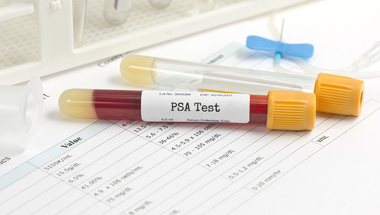Other tests
Researchers are looking at other tests that might help to diagnose prostate cancer. These tests aren’t widely available and we need more research to find out how useful they are.
To find out more about these tests, speak to your doctor or nurse. Or call our Specialist Nurses.
Free and total PSA test
This blood test measures the amount of two different types of PSA. It can help tell whether you have a high PSA level because of prostate cancer, or because of an enlarged prostate.
But doctors don’t yet agree on what levels of the different types of PSA show that a man has prostate cancer, so it’s not used that often. The test is only suitable if you have a PSA level between 4 and 10 ng/ml.
PCA3 test
This urine test measures the activity of a gene called PCA3. PCA3 is a gene that is active in all prostate cells but it's very active in prostate cancer cells.
Your doctor or nurse will use a finger to massage your prostate through the wall of the back passage. They will then ask you to give a urine sample. Cells from the prostate pass into the urine where they can be looked at with a special test that looks at your genes. This test might be useful for monitoring men who’ve already had a biopsy, or it might help specialists decide which men should have a biopsy.
At the moment the PCA3 test is only available in a few private hospitals and clinics, as we still need more research about how well it works.
References
Updated: January 2019 | Due for review: January 2021
- Ferro M, Buonerba C, Terracciano D, Lucarelli G, Cosimato V, Bottero D, et al. Biomarkers in localized prostate cancer. Future Oncology. 2016 Feb;12(3):399–411.
- Loeb S, Dani H. Whom to Biopsy: Prediagnostic Risk Stratification with Biomarkers, Nomograms, and Risk Calculators. Urologic Clinics of North America. 2017 Nov;44(4):517–24.
- Mottet N, Bellmunt J, Briers E, Bolla M, Bourke L, Cornford P, et al. EAU-ESTRO-ESUR-SIOG Guidelines on prostate cancer. European Association of Urology; 2017.


